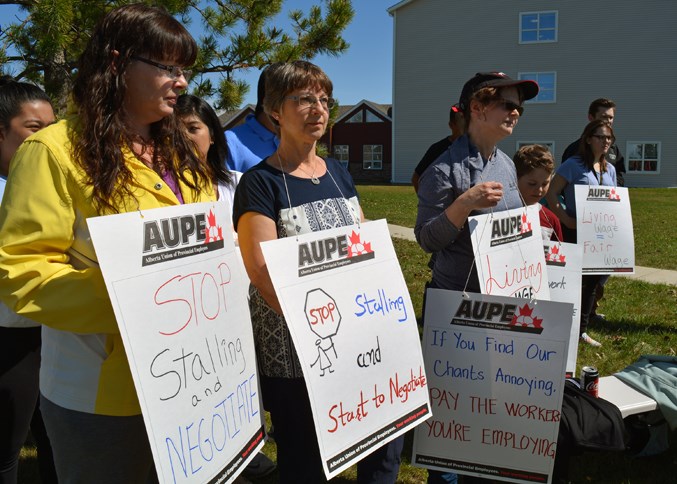When Alberta's 200,000 public employees begin their rounds of collective bargaining this year, there will likely be a "ghost at the table" influencing negotiations with their employer, a new report from the Parkland Institute says.
The report finds the rate of government legislative interference in public-sector bargaining has nearly tripled since 2000, despite Supreme Court decisions during the same period recognizing the right to collective bargaining and to strike are constitutionally protected.
These legal interventions include back-to-work legislation and other measures restricting the right to strike. In Alberta, the provincial government is also increasingly using a provision in the 2019 Public Sector Employers Act (PSEA) that allows the finance minister to issue "secret mandates" to employers which dictate what they can offer or agree to during bargaining.
Report co-author and University of Athabasca professor Jason Foster said the introduction of secret mandates was a first in Canada, and one that challenges the integrity of the bargaining process.
"It basically makes a bit of a mockery of each individual bargaining table," Foster said. "It kind of makes them a shadow of what they were, because they're not actually negotiating at the table, because the minister is bringing secret mandates down. And that's the problem."
Mandates can set the maximum wage increase or benefits an employer can agree to, though their exact content isn't shared with unions or the public. Without knowing which proposals are actually being offered by an employer and which have been set in stone by the provincial government, union officials quoted in the report said they had to guess at what elements of the contract were open to negotiation, slowing down the bargaining process and making the need for mediation more likely.
"They did say several times ‘as directed by the government’," said a union official quoted in the report. "Particularly when they [tabled a specific concessionary proposal] they wanted us to know, please don’t shoot the messenger, this is directed by the government."
These mandates at time seem to come "out of the blue," taking issue with small cost-neutral amendments about workplace equity or similarity to other contracts, and appeared to be more "in line with policy positions taken by provincial political figures rather than employer or worker interests," according to the report.
Guy Smith, president of the Alberta Union of Provincial Employees, said he has noticed more provincial interference in bargaining since the Provincial Bargaining and Compensation Office (PBCO) was established in 2015 while the NDP was in power, and that it has been increasing over time.
"Obviously, they're doubling down on the sort of legislative coercion, if you like, over employees in terms of what they're able to settle for when they go to the bargaining table," Smith said.
The PBCO is tasked with representing the government's interests as an employer and funder, and ensuring public-sector settlements align with its "fiscal, economic and public policy priorities."
"We know it's going to be a tough round of bargaining, and this kind of centralized influence is going to have some impact, but nothing we can't overcome," Smith said.
Foster said the PBCO, secret mandates, and other labour legislation introduced since the UCP came to power are part of a move to an "employer council model" of labour relations "where employers would coordinate their bargaining positions across sectors," such as one council that makes decisions about all health care employee agreements.
"What that does is that intensifies the capacity of the government to manage what happened to all the various bargaining tables. So that takes more power away each individual bargaining table and puts more in the hands of a coordinated body," he said.




